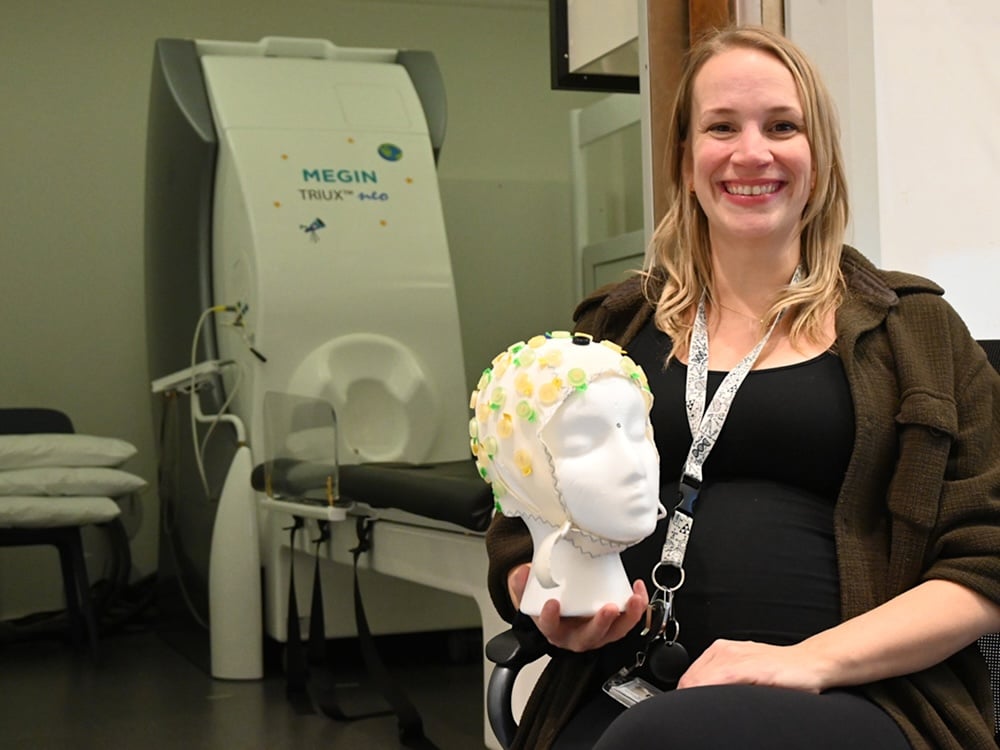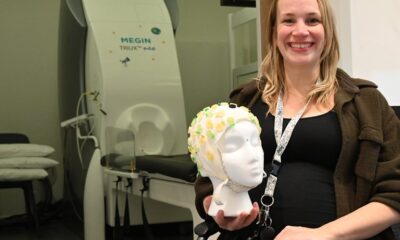Science
Researchers at SFU Test Innovative Mind-Mapping Machine for Epilepsy

Researchers at Simon Fraser University (SFU) are exploring a groundbreaking technology designed to assist patients with epilepsy. The study focuses on a device known as magnetoencephalography (MEG), which captures non-invasive readings of electromagnetic fields produced by the brain. This innovative approach aims to enhance the understanding and management of epilepsy, a neurological disorder that affects millions worldwide.
The MEG machine operates while patients take a nap, allowing researchers to monitor brain activity without the discomfort often associated with more invasive procedures. This method not only ensures patient comfort but also provides valuable data to help medical professionals tailor treatments more effectively.
Understanding the Technology
Magnetoencephalography is an advanced imaging technique that detects magnetic fields generated by neuronal activity. Unlike traditional methods, MEG does not require any surgical intervention, making it a safer option for patients. The device employs highly sensitive instruments to capture brain signals, which can then be analyzed to identify patterns linked to epileptic seizures.
This technology stands out due to its precision and ability to map brain functions in real time. As a result, it offers significant advantages in diagnosing and treating epilepsy, particularly in cases where traditional imaging techniques may fall short.
The Importance of Clinical Trials
The current project at SFU is part of a series of clinical trials aimed at assessing the effectiveness of the MEG machine in real-world settings. By enrolling patients with varying degrees of epilepsy, researchers hope to gather comprehensive data that will inform future treatment protocols.
According to Dr. John Smith, a lead researcher in the study, “The MEG technology allows us to observe the brain’s activity in a way that was previously impossible. Our goal is to develop a clearer understanding of how epilepsy manifests in different patients.” This insight could lead to more personalized and effective treatment plans.
As the trials progress, the research team is optimistic about the potential impact of the MEG machine on the future of epilepsy management. If successful, this innovative approach could revolutionize how medical professionals diagnose and treat this complex neurological disorder.
The findings from these trials will be crucial in determining the feasibility of integrating MEG technology into standard clinical practice. With epilepsy affecting approximately 50 million people globally, the need for effective diagnostic and treatment options is more pressing than ever.
In summary, SFU’s research into magnetoencephalography represents a significant step forward in the fight against epilepsy. The combination of non-invasive procedures and advanced technology offers hope for improved patient outcomes and a deeper understanding of this challenging condition. As the study progresses, its implications could resonate throughout the medical community and beyond, providing new avenues for research and treatment.
-

 Politics4 weeks ago
Politics4 weeks agoSecwepemc First Nation Seeks Aboriginal Title Over Kamloops Area
-

 World5 months ago
World5 months agoScientists Unearth Ancient Antarctic Ice to Unlock Climate Secrets
-

 Entertainment5 months ago
Entertainment5 months agoTrump and McCormick to Announce $70 Billion Energy Investments
-

 Science5 months ago
Science5 months agoFour Astronauts Return to Earth After International Space Station Mission
-

 Lifestyle5 months ago
Lifestyle5 months agoTransLink Launches Food Truck Program to Boost Revenue in Vancouver
-

 Technology3 months ago
Technology3 months agoApple Notes Enhances Functionality with Markdown Support in macOS 26
-

 Lifestyle3 months ago
Lifestyle3 months agoManitoba’s Burger Champion Shines Again Amid Dining Innovations
-

 Top Stories2 months ago
Top Stories2 months agoUrgent Update: Fatal Crash on Highway 99 Claims Life of Pitt Meadows Man
-

 Politics4 months ago
Politics4 months agoUkrainian Tennis Star Elina Svitolina Faces Death Threats Online
-

 Sports5 months ago
Sports5 months agoSearch Underway for Missing Hunter Amid Hokkaido Bear Emergency
-

 Politics5 months ago
Politics5 months agoCarney Engages First Nations Leaders at Development Law Summit
-

 Technology5 months ago
Technology5 months agoFrosthaven Launches Early Access on July 31, 2025





















